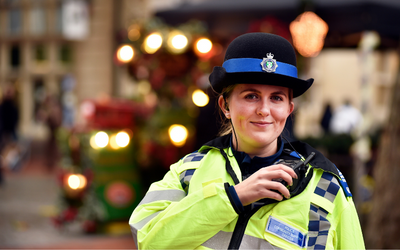Meet Hannah Elliot, Police Community Support Officer (PCSO)
Role: Police Community Support Officer (PCSO) 
Length of service: 1.5 years
What attracted to you policing, specifically as a PCSO?
I wanted to work in policing, and becoming a PCSO is a great way to do this! I knew I wouldn’t enjoy an office based job as I get bored quite quickly, so the fact that the role is people facing and involved being out and about in the community was a huge attraction.
What did you do prior to joining TVP?
I was a Teaching Assistant at a secondary school for three years. This mostly involved working with children with autism and other learning difficulties, which fed well into the PCSO role.
What transferable skills did you bring to the PCSO role?
The biggest skill is definitely communication, especially with the more challenging kids in my previous job that weren’t always receptive to discipline! Working and communicating with difference in the form of neurodiversity and learning difficulties, and knowing how to manage different people/groups in a way that’s effective and not patronising has been a huge bonus.
Other skills such as managing conflict, having empathy and problem solving have also helped me integrate into becoming PCSO.
I also believe anyone can use their own past experiences and interactions with the emergency services to think about they would like to be treated in times of potential crisis.
What surprised you about the world of policing?
I didn’t expect the role to be so ‘free’ in the respect that you have a lot of freedom over your day. Sometimes you get specific direction, but other times I can use my initiative and focus my efforts on areas within my community that I believe need the most attention. I feel as though I am respected and valued as someone who understands the needs of their community.
This has extended beyond my day-to-day and I’ve now completed a course to become a Dyslexia Workplace Needs Assessor. This is something I wouldn’t have had the opportunity to do had I not become a PCSO in the first place.
What does your day-to-day look like as a PCSO?
Each day is very different and really varies, but are usually dictated by our patrols. Sometimes we have specific areas that we need to visit, e.g. if there are particular problems, antisocial behaviour or vulnerable individuals etc., but other times I find myself at community events, housing visits, school talks etc.
One time, some vulnerable elderly people even invited me to their bingo game after I’d visited them, so you really never know where your day is headed!
What advice would you give to those considering becoming a PCSO?
Don’t let anxiety get in your way. Joining the police isn’t as terrifying as you may think it is! As long as you can talk to people, have a decent sense of empathy and hard work, you’ll make a fantastic PCSO.
–
If Hannah’s story has inspired you to consider a career as a PCSO, visit our PCSO page for further information and to begin your journey.


 Facebook
Facebook
 Twitter
Twitter
 Linkedin
Linkedin
 Instagram
Instagram